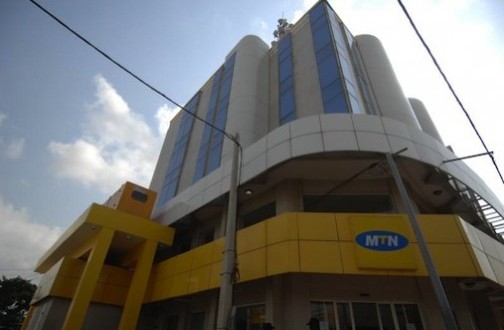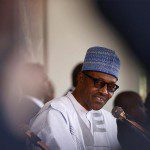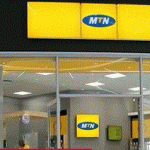A $10.1 billion demand by Nigerian authorities from South African telecoms group MTN (MTNJ.J) makes its planned debut stock market listing in the country “pretty challenging and awkward”, the group’s chief financial officer said on Wednesday.
Nigeria’s central bank has asked MTN to repatriate $8.1 billion in monies sent abroad, claiming the funds were sent without proper certification. The company is also facing a $2 billion tax demand.
MTN has denied any wrongdoing.
Ralph Mupita said preparation of the company’s initial public offering (IPO) prospectus is far advanced.
“We are not sitting here saying the listing is off. The listing is to remain on track,” he told CNBC Africa television.
“It makes the IPO that we had planned pretty challenging and awkward but we have got to explore other options of continuing to meet the listing requirements,” he said.
MTN has said it will engage with the central bank over the demand. It said the monies sent out of the country were equity dividends.
Sources have told Reuters that the scale of the central bank’s demand affects market conditions, casting into doubt the likelihood that the listing process would be completed by the end of the year, if at all.
Shares in MTN fell nearly a third in Johannesburg in the days after the central bank issued its demand on Aug 29. Mupita said the shares were oversold and trading below broker consensus. MTN’s shares were down 2.78 percent at 1800 GMT on Wednesday.
Mupita said MTN was committed to Nigeria and would stay in the country, adding that the company was looking forward to an amicable resolution to the matters. Nigeria is MTN’s biggest market, accounting for a third of its annual core profit.
Some political analysts see politics as a factor in the pressure on MTN, as Nigerian President Muhammadu Buhari, who took office in 2015 on promises to push through tougher regulation, is seeking re-election in 2019.
MTN’s latest troubles come about two years after it agreed to pay more than $1 billion to settle a dispute over SIM cards in Nigeria, whose finances have been hit by a weak economy and volatile global oil prices.
Mupita said the listing was part of the conditions it had committed to meeting as part of the settlement of the previous fine. He said the company saw no connection between its present challenges in Nigeria and that fine.
MTN was working with local and foreign advisers on how to carry out the listing, Mupita said.
In response to the tax demand, MTN filed a lawsuit in Nigeria on Monday against the country’s attorney general aimed at protecting its assets. It is also seeking 3 billion naira ($10 million) in damages from the West African country in court and legal expenses.
“We are going to engage with a variety of authorities,” Mupita said. “We will seek engagements at the highest level in the central bank and AGF.”
A $10.1 billion demand by Nigerian authorities from South African telecoms group MTN (MTNJ.J) makes its planned debut stock market listing in the country “pretty challenging and awkward”, the group’s chief financial officer said on Wednesday.
Nigeria’s central bank has asked MTN to repatriate $8.1 billion in monies sent abroad, claiming the funds were sent without proper certification. The company is also facing a $2 billion tax demand.
MTN has denied any wrongdoing.
Ralph Mupita said preparation of the company’s initial public offering (IPO) prospectus is far advanced.
“We are not sitting here saying the listing is off. The listing is to remain on track,” he told CNBC Africa television.
“It makes the IPO that we had planned pretty challenging and awkward but we have got to explore other options of continuing to meet the listing requirements,” he said.
MTN has said it will engage with the central bank over the demand. It said the monies sent out of the country were equity dividends.
Sources have told Reuters that the scale of the central bank’s demand affects market conditions, casting into doubt the likelihood that the listing process would be completed by the end of the year, if at all.
Shares in MTN fell nearly a third in Johannesburg in the days after the central bank issued its demand on Aug 29. Mupita said the shares were oversold and trading below broker consensus. MTN’s shares were down 2.78 percent at 1800 GMT on Wednesday.
Mupita said MTN was committed to Nigeria and would stay in the country, adding that the company was looking forward to an amicable resolution to the matters. Nigeria is MTN’s biggest market, accounting for a third of its annual core profit.
Some political analysts see politics as a factor in the pressure on MTN, as Nigerian President Muhammadu Buhari, who took office in 2015 on promises to push through tougher regulation, is seeking re-election in 2019.
MTN’s latest troubles come about two years after it agreed to pay more than $1 billion to settle a dispute over SIM cards in Nigeria, whose finances have been hit by a weak economy and volatile global oil prices.
Mupita said the listing was part of the conditions it had committed to meeting as part of the settlement of the previous fine. He said the company saw no connection between its present challenges in Nigeria and that fine.
MTN was working with local and foreign advisers on how to carry out the listing, Mupita said.
In response to the tax demand, MTN filed a lawsuit in Nigeria on Monday against the country’s attorney general aimed at protecting its assets. It is also seeking 3 billion naira ($10 million) in damages from the West African country in court and legal expenses.
“We are going to engage with a variety of authorities,” Mupita said. “We will seek engagements at the highest level in the central bank and AGF.”
A $10.1 billion demand by Nigerian authorities from South African telecoms group MTN (MTNJ.J) makes its planned debut stock market listing in the country “pretty challenging and awkward”, the group’s chief financial officer said on Wednesday.
Nigeria’s central bank has asked MTN to repatriate $8.1 billion in monies sent abroad, claiming the funds were sent without proper certification. The company is also facing a $2 billion tax demand.
MTN has denied any wrongdoing.
Ralph Mupita said preparation of the company’s initial public offering (IPO) prospectus is far advanced.
“We are not sitting here saying the listing is off. The listing is to remain on track,” he told CNBC Africa television.
“It makes the IPO that we had planned pretty challenging and awkward but we have got to explore other options of continuing to meet the listing requirements,” he said.
MTN has said it will engage with the central bank over the demand. It said the monies sent out of the country were equity dividends.
Sources have told Reuters that the scale of the central bank’s demand affects market conditions, casting into doubt the likelihood that the listing process would be completed by the end of the year, if at all.
Shares in MTN fell nearly a third in Johannesburg in the days after the central bank issued its demand on Aug 29. Mupita said the shares were oversold and trading below broker consensus. MTN’s shares were down 2.78 percent at 1800 GMT on Wednesday.
Mupita said MTN was committed to Nigeria and would stay in the country, adding that the company was looking forward to an amicable resolution to the matters. Nigeria is MTN’s biggest market, accounting for a third of its annual core profit.
Some political analysts see politics as a factor in the pressure on MTN, as Nigerian President Muhammadu Buhari, who took office in 2015 on promises to push through tougher regulation, is seeking re-election in 2019.
MTN’s latest troubles come about two years after it agreed to pay more than $1 billion to settle a dispute over SIM cards in Nigeria, whose finances have been hit by a weak economy and volatile global oil prices.
Mupita said the listing was part of the conditions it had committed to meeting as part of the settlement of the previous fine. He said the company saw no connection between its present challenges in Nigeria and that fine.
MTN was working with local and foreign advisers on how to carry out the listing, Mupita said.
In response to the tax demand, MTN filed a lawsuit in Nigeria on Monday against the country’s attorney general aimed at protecting its assets. It is also seeking 3 billion naira ($10 million) in damages from the West African country in court and legal expenses.
“We are going to engage with a variety of authorities,” Mupita said. “We will seek engagements at the highest level in the central bank and AGF.”
A $10.1 billion demand by Nigerian authorities from South African telecoms group MTN (MTNJ.J) makes its planned debut stock market listing in the country “pretty challenging and awkward”, the group’s chief financial officer said on Wednesday.
Nigeria’s central bank has asked MTN to repatriate $8.1 billion in monies sent abroad, claiming the funds were sent without proper certification. The company is also facing a $2 billion tax demand.
MTN has denied any wrongdoing.
Ralph Mupita said preparation of the company’s initial public offering (IPO) prospectus is far advanced.
“We are not sitting here saying the listing is off. The listing is to remain on track,” he told CNBC Africa television.
“It makes the IPO that we had planned pretty challenging and awkward but we have got to explore other options of continuing to meet the listing requirements,” he said.
MTN has said it will engage with the central bank over the demand. It said the monies sent out of the country were equity dividends.
Sources have told Reuters that the scale of the central bank’s demand affects market conditions, casting into doubt the likelihood that the listing process would be completed by the end of the year, if at all.
Shares in MTN fell nearly a third in Johannesburg in the days after the central bank issued its demand on Aug 29. Mupita said the shares were oversold and trading below broker consensus. MTN’s shares were down 2.78 percent at 1800 GMT on Wednesday.
Mupita said MTN was committed to Nigeria and would stay in the country, adding that the company was looking forward to an amicable resolution to the matters. Nigeria is MTN’s biggest market, accounting for a third of its annual core profit.
Some political analysts see politics as a factor in the pressure on MTN, as Nigerian President Muhammadu Buhari, who took office in 2015 on promises to push through tougher regulation, is seeking re-election in 2019.
MTN’s latest troubles come about two years after it agreed to pay more than $1 billion to settle a dispute over SIM cards in Nigeria, whose finances have been hit by a weak economy and volatile global oil prices.
Mupita said the listing was part of the conditions it had committed to meeting as part of the settlement of the previous fine. He said the company saw no connection between its present challenges in Nigeria and that fine.
MTN was working with local and foreign advisers on how to carry out the listing, Mupita said.
In response to the tax demand, MTN filed a lawsuit in Nigeria on Monday against the country’s attorney general aimed at protecting its assets. It is also seeking 3 billion naira ($10 million) in damages from the West African country in court and legal expenses.
“We are going to engage with a variety of authorities,” Mupita said. “We will seek engagements at the highest level in the central bank and AGF.”
A $10.1 billion demand by Nigerian authorities from South African telecoms group MTN (MTNJ.J) makes its planned debut stock market listing in the country “pretty challenging and awkward”, the group’s chief financial officer said on Wednesday.
Nigeria’s central bank has asked MTN to repatriate $8.1 billion in monies sent abroad, claiming the funds were sent without proper certification. The company is also facing a $2 billion tax demand.
MTN has denied any wrongdoing.
Ralph Mupita said preparation of the company’s initial public offering (IPO) prospectus is far advanced.
“We are not sitting here saying the listing is off. The listing is to remain on track,” he told CNBC Africa television.
“It makes the IPO that we had planned pretty challenging and awkward but we have got to explore other options of continuing to meet the listing requirements,” he said.
MTN has said it will engage with the central bank over the demand. It said the monies sent out of the country were equity dividends.
Sources have told Reuters that the scale of the central bank’s demand affects market conditions, casting into doubt the likelihood that the listing process would be completed by the end of the year, if at all.
Shares in MTN fell nearly a third in Johannesburg in the days after the central bank issued its demand on Aug 29. Mupita said the shares were oversold and trading below broker consensus. MTN’s shares were down 2.78 percent at 1800 GMT on Wednesday.
Mupita said MTN was committed to Nigeria and would stay in the country, adding that the company was looking forward to an amicable resolution to the matters. Nigeria is MTN’s biggest market, accounting for a third of its annual core profit.
Some political analysts see politics as a factor in the pressure on MTN, as Nigerian President Muhammadu Buhari, who took office in 2015 on promises to push through tougher regulation, is seeking re-election in 2019.
MTN’s latest troubles come about two years after it agreed to pay more than $1 billion to settle a dispute over SIM cards in Nigeria, whose finances have been hit by a weak economy and volatile global oil prices.
Mupita said the listing was part of the conditions it had committed to meeting as part of the settlement of the previous fine. He said the company saw no connection between its present challenges in Nigeria and that fine.
MTN was working with local and foreign advisers on how to carry out the listing, Mupita said.
In response to the tax demand, MTN filed a lawsuit in Nigeria on Monday against the country’s attorney general aimed at protecting its assets. It is also seeking 3 billion naira ($10 million) in damages from the West African country in court and legal expenses.
“We are going to engage with a variety of authorities,” Mupita said. “We will seek engagements at the highest level in the central bank and AGF.”
A $10.1 billion demand by Nigerian authorities from South African telecoms group MTN (MTNJ.J) makes its planned debut stock market listing in the country “pretty challenging and awkward”, the group’s chief financial officer said on Wednesday.
Nigeria’s central bank has asked MTN to repatriate $8.1 billion in monies sent abroad, claiming the funds were sent without proper certification. The company is also facing a $2 billion tax demand.
MTN has denied any wrongdoing.
Ralph Mupita said preparation of the company’s initial public offering (IPO) prospectus is far advanced.
“We are not sitting here saying the listing is off. The listing is to remain on track,” he told CNBC Africa television.
“It makes the IPO that we had planned pretty challenging and awkward but we have got to explore other options of continuing to meet the listing requirements,” he said.
MTN has said it will engage with the central bank over the demand. It said the monies sent out of the country were equity dividends.
Sources have told Reuters that the scale of the central bank’s demand affects market conditions, casting into doubt the likelihood that the listing process would be completed by the end of the year, if at all.
Shares in MTN fell nearly a third in Johannesburg in the days after the central bank issued its demand on Aug 29. Mupita said the shares were oversold and trading below broker consensus. MTN’s shares were down 2.78 percent at 1800 GMT on Wednesday.
Mupita said MTN was committed to Nigeria and would stay in the country, adding that the company was looking forward to an amicable resolution to the matters. Nigeria is MTN’s biggest market, accounting for a third of its annual core profit.
Some political analysts see politics as a factor in the pressure on MTN, as Nigerian President Muhammadu Buhari, who took office in 2015 on promises to push through tougher regulation, is seeking re-election in 2019.
MTN’s latest troubles come about two years after it agreed to pay more than $1 billion to settle a dispute over SIM cards in Nigeria, whose finances have been hit by a weak economy and volatile global oil prices.
Mupita said the listing was part of the conditions it had committed to meeting as part of the settlement of the previous fine. He said the company saw no connection between its present challenges in Nigeria and that fine.
MTN was working with local and foreign advisers on how to carry out the listing, Mupita said.
In response to the tax demand, MTN filed a lawsuit in Nigeria on Monday against the country’s attorney general aimed at protecting its assets. It is also seeking 3 billion naira ($10 million) in damages from the West African country in court and legal expenses.
“We are going to engage with a variety of authorities,” Mupita said. “We will seek engagements at the highest level in the central bank and AGF.”
A $10.1 billion demand by Nigerian authorities from South African telecoms group MTN (MTNJ.J) makes its planned debut stock market listing in the country “pretty challenging and awkward”, the group’s chief financial officer said on Wednesday.
Nigeria’s central bank has asked MTN to repatriate $8.1 billion in monies sent abroad, claiming the funds were sent without proper certification. The company is also facing a $2 billion tax demand.
MTN has denied any wrongdoing.
Ralph Mupita said preparation of the company’s initial public offering (IPO) prospectus is far advanced.
“We are not sitting here saying the listing is off. The listing is to remain on track,” he told CNBC Africa television.
“It makes the IPO that we had planned pretty challenging and awkward but we have got to explore other options of continuing to meet the listing requirements,” he said.
MTN has said it will engage with the central bank over the demand. It said the monies sent out of the country were equity dividends.
Sources have told Reuters that the scale of the central bank’s demand affects market conditions, casting into doubt the likelihood that the listing process would be completed by the end of the year, if at all.
Shares in MTN fell nearly a third in Johannesburg in the days after the central bank issued its demand on Aug 29. Mupita said the shares were oversold and trading below broker consensus. MTN’s shares were down 2.78 percent at 1800 GMT on Wednesday.
Mupita said MTN was committed to Nigeria and would stay in the country, adding that the company was looking forward to an amicable resolution to the matters. Nigeria is MTN’s biggest market, accounting for a third of its annual core profit.
Some political analysts see politics as a factor in the pressure on MTN, as Nigerian President Muhammadu Buhari, who took office in 2015 on promises to push through tougher regulation, is seeking re-election in 2019.
MTN’s latest troubles come about two years after it agreed to pay more than $1 billion to settle a dispute over SIM cards in Nigeria, whose finances have been hit by a weak economy and volatile global oil prices.
Mupita said the listing was part of the conditions it had committed to meeting as part of the settlement of the previous fine. He said the company saw no connection between its present challenges in Nigeria and that fine.
MTN was working with local and foreign advisers on how to carry out the listing, Mupita said.
In response to the tax demand, MTN filed a lawsuit in Nigeria on Monday against the country’s attorney general aimed at protecting its assets. It is also seeking 3 billion naira ($10 million) in damages from the West African country in court and legal expenses.
“We are going to engage with a variety of authorities,” Mupita said. “We will seek engagements at the highest level in the central bank and AGF.”
A $10.1 billion demand by Nigerian authorities from South African telecoms group MTN (MTNJ.J) makes its planned debut stock market listing in the country “pretty challenging and awkward”, the group’s chief financial officer said on Wednesday.
Nigeria’s central bank has asked MTN to repatriate $8.1 billion in monies sent abroad, claiming the funds were sent without proper certification. The company is also facing a $2 billion tax demand.
MTN has denied any wrongdoing.
Ralph Mupita said preparation of the company’s initial public offering (IPO) prospectus is far advanced.
“We are not sitting here saying the listing is off. The listing is to remain on track,” he told CNBC Africa television.
“It makes the IPO that we had planned pretty challenging and awkward but we have got to explore other options of continuing to meet the listing requirements,” he said.
MTN has said it will engage with the central bank over the demand. It said the monies sent out of the country were equity dividends.
Sources have told Reuters that the scale of the central bank’s demand affects market conditions, casting into doubt the likelihood that the listing process would be completed by the end of the year, if at all.
Shares in MTN fell nearly a third in Johannesburg in the days after the central bank issued its demand on Aug 29. Mupita said the shares were oversold and trading below broker consensus. MTN’s shares were down 2.78 percent at 1800 GMT on Wednesday.
Mupita said MTN was committed to Nigeria and would stay in the country, adding that the company was looking forward to an amicable resolution to the matters. Nigeria is MTN’s biggest market, accounting for a third of its annual core profit.
Some political analysts see politics as a factor in the pressure on MTN, as Nigerian President Muhammadu Buhari, who took office in 2015 on promises to push through tougher regulation, is seeking re-election in 2019.
MTN’s latest troubles come about two years after it agreed to pay more than $1 billion to settle a dispute over SIM cards in Nigeria, whose finances have been hit by a weak economy and volatile global oil prices.
Mupita said the listing was part of the conditions it had committed to meeting as part of the settlement of the previous fine. He said the company saw no connection between its present challenges in Nigeria and that fine.
MTN was working with local and foreign advisers on how to carry out the listing, Mupita said.
In response to the tax demand, MTN filed a lawsuit in Nigeria on Monday against the country’s attorney general aimed at protecting its assets. It is also seeking 3 billion naira ($10 million) in damages from the West African country in court and legal expenses.
“We are going to engage with a variety of authorities,” Mupita said. “We will seek engagements at the highest level in the central bank and AGF.”













